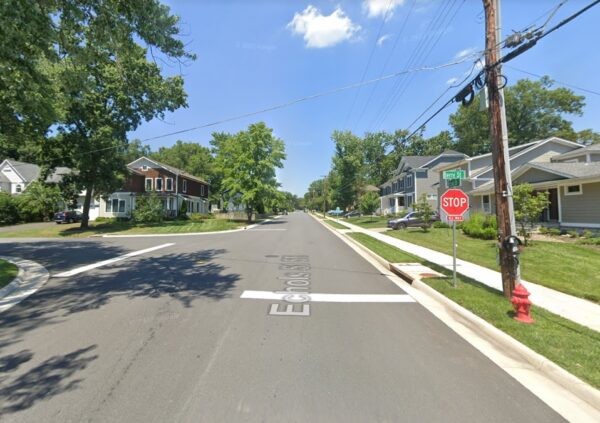
The drive down Echols Street SE is about to get bumpier — and, the Town of Vienna hopes, a little slower.
After some initial skepticism, the Vienna Town Council gave its support on April 24 to traffic-calming measures designed to force drivers to slow down on the two-lane residential street, which crosses over Wolftrap Creek.
Town staff and the Transportation Safety Commission recommended installing three speed tables between Branch Road SE and Follin Lane, adding solid white parking lane lines on both sides of the roadway, and painting the word “Stop” before the three-way stop sign at the Berry Street SE intersection.
The recommendations are based on a traffic study conducted last year that showed 85% of vehicles driving up to 31 mph on the 25-mph street, Vienna’s acting public works director Christine Horner told the town council.
Some council members questioned whether those speeds are enough to need traffic calming.
“I’ve gone to the street a couple of times,” Councilmember Howard Springsteen said. “I personally would prefer to go with two [speed tables]. I think three is potentially excessive for that street.”
Echols Street just meets Vienna’s threshold for traffic calming, staff said. The town’s street safety guide states that physical measures can be considered if the 85th percentile average speed is 31 mph or higher, along with other criteria based on the type of road and traffic volumes.
Vienna Transportation Engineer Andrew Jinks noted that there was an additional police presence on the street when the traffic study was conducted on Nov. 3-10 last year, so typical speeds are likely higher than what was recorded.
Requested by a resident petition, the study counted a total of 3,765 vehicles in front of 509 Echols Street and 18,250 vehicles at the Wolftrap Creek crossing that week, observing speeds from 3 to 55 mph. The average speed at the creek was 27.2 mph.
“Basically, half the cars are going above the speed limit,” Councilmember Ray Brill observed.
According to a staff proposal, the speed tables will be located just before the Delano Drive SE intersection and on either side of the E Street intersection.
Speed tables are raised like speed bumps, but they’re wider and have a flat top, making them less disruptive to the passing vehicles. They can reduce speeds by around 6-9 mph on average, according to the Virginia Department of Transportation’s traffic calming guide.
Multiple tables are often needed for them to be effective, Jinks said. VDOT recommends placing the tables about 200 to 500 feet apart.
“If staff says it takes three to get the proper spacing to make an effect, I have to defer to staff on this,” Councilmember Chuck Anderson said, as Springsteen ultimately agreed.
The project has an estimated total cost of $20,000, including $6,000 for each of the speed tables, according to Jinks. The traffic calming devices will likely be installed within the next two to three months, a town spokesperson says.
Image via Google Maps
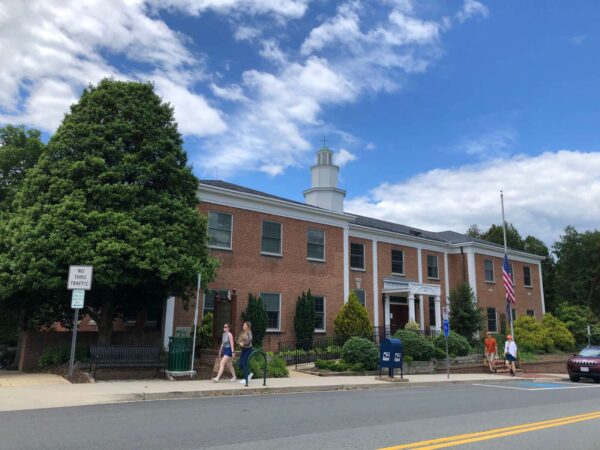
The Town of Vienna will reduce its real estate tax rate by a full cent for the upcoming fiscal year 2024, which begins July 1.
Approved unanimously by the town council on Monday (April 24), the reduction is bigger than the quarter-cent decrease first proposed by Town Manager Mercury Payton last month, but it still won’t be enough to completely counterbalance the rising property values most homeowners experienced this year.
The new tax rate of 19.5 cents per $100 of assessed value represents the 11th consecutive year where the town has adopted a flat or reduced rate compared to the previous year, according to a press release.
“While that rate doesn’t quite equalize everyone, it does help account for the increase in assessments,” Vienna Finance Director Marion Serfass told the town council. “…As homeowners in Vienna, we’re all pleased to know our houses are increasing in value. We’re not quite so pleased to pay increased taxes on them, but this lowering of the tax rate will offset that somewhat.”
On average, real estate assessments in Vienna increased by 10% this year, Mayor Linda Colbert said in the press release.
According to Colbert, the town council asked staff to revisit their financial forecasts to see if it would be possible to “to reduce that burden on taxpayers.”
“Thanks to conservative budgeting, no increase in health insurance rates for Town staff and an increase in other revenues reported later in the budget process, the finance staff determined that Vienna could further reduce the tax rate in the proposed budget and still operate at high standards,” Colbert said.
When presenting his proposed $50.1 million budget in March, Payton said the town anticipated getting increased revenue from business licenses, meals and sales taxes and interest rates, enabling it to address inflation and employee compensation.
Though the one-cent real estate tax rate reduction won’t stop many residents from getting higher bills, it will lower the average increase while allowing the town to maintain a rainy day fund with over 18% of the next year’s budget, the town says.
“We don’t want to be in a position where we cut the tax rate too far,” Serfass said. “We’re all worried about storms on the horizon. We don’t know exactly what’s going to happen, so we’re trying to be conservative.”
The proposed budget, which adds one staff position each in the public works and planning departments, is scheduled to go before the town council for a final vote on May 15.
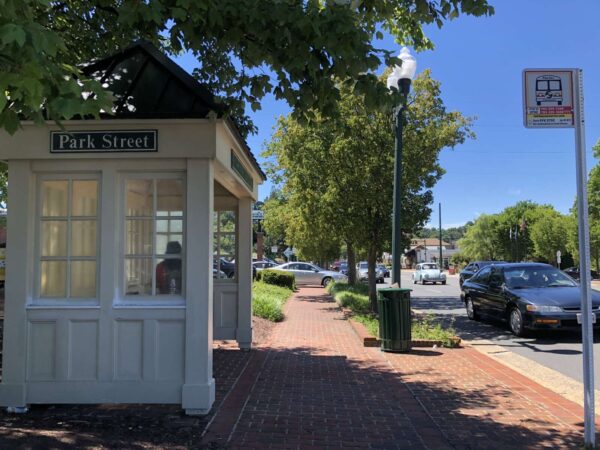
The Town of Vienna wants to bring more color to Maple Avenue and Church Street with a landscaping refresh, but new greenery won’t be in the ground until August at the earliest.
Department of Parks and Recreation staff approached the Vienna Town Council on Monday (March 20) to request $600,000 for a landscaping contractor that will help design and install new planters along the town’s main commercial streets.
However, uncertainty over how exactly those funds will be spent led the council to postpone a vote until its next meeting of April 10.
“Many of us have questions we’d like to get answers to,” Mayor Linda Colbert said.
Staff had hoped to get design options for the improvements this April and choose a final one in May so that the project could finish by the end of July, according to a request for proposals issued Jan. 12.
The town was seeking a vendor to design and install 81 landscape planters on both sides of Maple Avenue between East Street and 213 Maple Ave. West, along with 46 planters on both sides of Church Street between Mill Street NE and Lawyers Road NW.
The existing landscaping, including planters, brick sidewalks, streetlamps and bus shelters, was installed on both streets approximately 20 years ago, according to the town.
“The landscape plants have matured over the years and the uniformity of the design has waned,” the RFP said. “The trees are the predominant feature of the landscape planters while the shrub and herbaceous perennial layer is inconsistent and often absent.”
In addition to the actual plants, the requested funding would cover soil remediation, root pruning, the public engagement process, traffic control and sidewalk closings, and any needed removals of vegetation other than trees, which will be taken care of by town staff, Parks and Recreation Director Leslie Herman said.
The Tysons-based firm LSG Landscape Architecture, which previously assisted Vienna with a study of the Maple Avenue streetscape, was selected as the contract recipient.
Councilmember Chuck Anderson balked at the lack of details on the price of individual plants and other expenses, questioning why staff was seeking $600,000 right now when, so far, LSG has only provided a cost estimate of about $83,000 for the design portion of the project.
“I understand that the design’s not done, but we lack any leverage over pricing, so for the remaining $520,000, in theory, they could come up with whatever they wanted at whatever price,” Anderson said. “…This does not sound like to me to be sound contracting practices, particularly for a contract that’s this big. I think we need more certainty.”
According to Herman, the town believes having one firm design and install the project would be more efficient than doing separate RFPs, but after talking to LSG, staff decided they could get a more accurate estimate for the cost of implementation after the design is chosen.
Though initially skeptical, other council members ultimately agreed with Anderson that more financial information is needed after staff seemed unable to explain how they arrived at $600,000 as their proposed funding cap.
Despite her lingering questions, Colbert lauded the project’s overall goal of bringing more life and color to Vienna’s streets year-round.
“We’ve had residents come to us, email, come to our meetings and speak, businesses have talked to me about expecting Maple Avenue and Church Street to be greatly improved,” Colbert said. “It will help our businesses, and it will define our town better, I think, as people drive into town.”
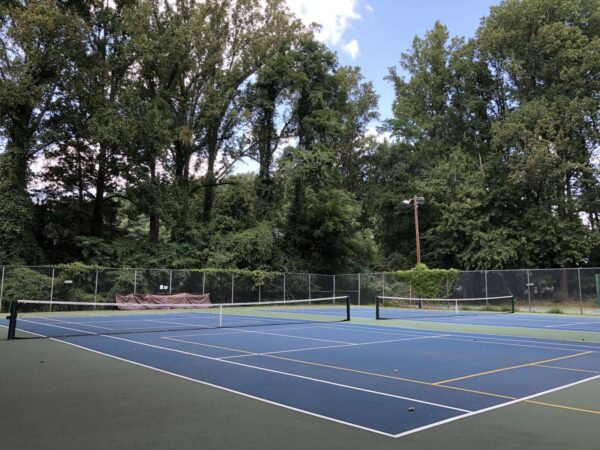
Getting court time at Glyndon Park in Vienna may be tougher going forward for pickleball players.
In the hopes of alleviating noise complaints from nearby residents, the Vienna Town Council approved a significant reduction in playing time for the increasingly popular sport at the 11-acre park’s four courts during its Monday (Jan. 23) meeting.
However, the new schedule represents less of a reduction in days than initially proposed, allowing pickleball on four days per week instead of just three. It also eliminates shared playing times between tennis and pickleball, so hours designated for pickleball will be exclusively reserved for that sport.
“I see this as a long-term issue,” said Councilmember Chuck Anderson, who proposed the adopted schedule. “I think we all on council agree on that, that what we need to do is roll up our sleeves and take a look at capacity. This is a rapidly growing game. It’s very popular, but it also has a noise issue, and it’s something I think we need to work on and manage.
Pickleball is now limited at the park to the following hours:
Dec. 1 to the end of February
- 10 a.m. to 5 p.m. on Monday, Wednesday and Friday
- 10 a.m. to 1 p.m. on Saturday
March 1 through Nov. 30
- 9 a.m. to 7 p.m. Monday, Wednesday and Friday
- 9 a.m. to 1 p.m. Saturday
Outside of those hours, only tennis will be allowed. The courts close at 10 p.m.
As part of the approved motion, the council also directed the Department of Parks and Recreation to post signage at the park recommending that pickleball players use “quiet” paddles that supposedly make less noise.
Prior to Monday’s 5-2 vote, pickleball and tennis were both permitted at Glyndon Park (300 Glyndon Street NE) seven days a week, but they alternated during open-play hours on Monday through Thursday mornings — a schedule confusing enough that the town council spent several minutes of a Jan. 23 conference session on the proposed changes trying to get clarification.
Anderson said he had considered continuing some shared usage of the courts as part of his proposal but ultimately decided it would be too complicated. He also found that the suggestion didn’t appeal to either pickleball players or the residents who raised the noise issues.
“If you start sharing [on pickleball days], you have to do it the other way too,” he said. “On a tennis day, if the tennis courts aren’t being used and a pickleball player shows up, it would be used, and I just don’t think that’s workable.”
Since Vienna added pickleball lines to Glyndon Park’s two tennis courts in 2020, some residents have complained that the noise made by paddles hitting the plastic balls is “unbearable,” an issue that has cropped up across the country.
Town staff reduced open-play hours and introduced a reservation system for afternoons, but complaints persisted, with some residents calling for pickleball to be banned from the park altogether, Parks and Rec Director Leslie Herman told the council.
After talking with staff, the residents agreed limiting pickleball to Mondays, Wednesdays and Saturdays would be acceptable, leading Mayor Linda Colbert and Councilmember Ed Somers to object to the addition of a fourth day.
“I’m just concerned about adding a fourth day at this point. I might get there eventually if more people use the soft paddles, if the noise is reduced, if things change, I could get there very easily, but I’m not there right now,” Somers said to a smattering of claps from the audience.
Anderson and other supporters of the four-day schedule said it would give players more flexibility, while starting play later and ending it earlier.
“There’s just a one-hour difference, and it gives people more peace in the mornings and evenings,” Councilmember Nisha Patel noted.
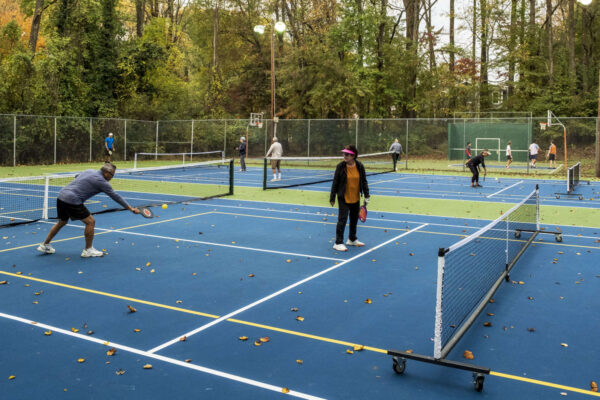
The nationwide face-off between pickleball enthusiasts and homeowners has arrived in the Town of Vienna.
In the hopes of quieting resident noise complaints, the town council is set to vote on Monday (Jan. 30) to reduce pickleball play to three days per week at the courts in Glyndon Park (300 Glyndon Street NE).
Currently available seven days a week, the four pickleball courts would open Mondays, Wednesdays and Saturdays under the proposal from the Vienna Parks and Recreation Department. The hours of 8 a.m. to 8 p.m. on Mondays and Wednesdays would remain the same, but on Saturdays, they would end at 5 p.m.
Town staff recommended an 8 a.m. start time for Saturday, but at a conference session on Jan. 23 that saw some tense back-and-forth exchanges on both the dais and from the audience, a few council members suggested considering 9 a.m. instead, since kids might want to sleep in on the weekend.
“I don’t know that anybody is a hundred percent thrilled with this, but it is in my mind a compromise, and it’s something we can do right now,” Mayor Linda Colbert said.
Glyndon Park’s pickleball courts were welcomed with gusto by local players — including the mayor, who also partakes in tennis — when they opened in October 2020. With aid from the Vienna Pickleball Club, which paid for some of the equipment, the town added pickleball markings to the two existing tennis courts as part of a planned refurbishment.
However, players have run afoul of some nearby residents, who describe the sound of paddles hitting the plastic balls as “unbearable, loud and constant,” according to one comment in an October survey conducted by the parks department.
“The noise is unbearable,” wrote a resident of Jean Place NE, which is across the street from the courts. “The constant popping 12 hours a day 7 days a week is borderline torture. We cannot use our outdoor space anymore due to pickleball and cannot open our windows.”
The survey went to 34 households and received 17 responses, including seven from people who reported having no issues with pickleball. Parking and traffic complaints also came up, but Parks Director Leslie Herman said those “have been taken care of” with signage directing players to an overflow parking lot by the baseball diamonds.
Vienna isn’t alone in seeing clashes between homeowners and pickleball players. As the sport has grown in popularity over the past decade, so have the noise complaints, leading some communities to close courts and others to be taken to court — including in nearby Arlington County.
The sound level for pickleball is anywhere from 57 to 79 decibels, depending on proximity and the type of equipment used. That’s 25 decibels higher than a tennis racket hitting a ball, according to the Los Angeles Times.
People talking can also contribute to the noise levels, Councilmember Ray Brill said, recalling a visit to Glyndon Park where he saw dozens of people at the courts who weren’t playing.
“I love exercising, and I love playing sports outdoors, but we have neighbors we have to be considerate of,” Brill said. “There’s no shortcuts, so we have to compromise. We have to allow people to play, but they have to take steps to reduce the noise.” Read More
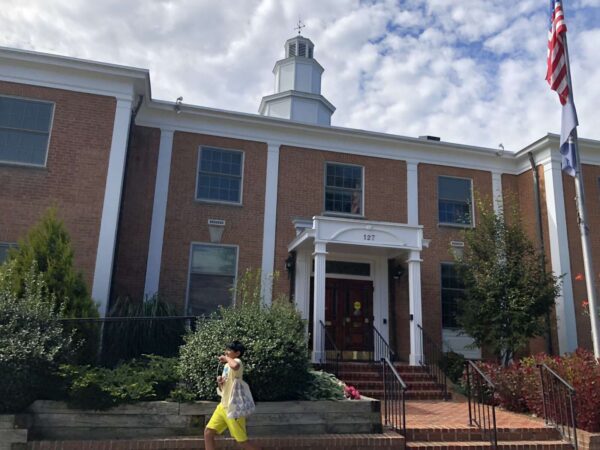
The Town of Vienna wants to give its employees more breathing room — literally.
Some space has been freed up in town hall by the Vienna Police Department’s criminal investigations bureau relocating to its recently completed station. The department’s transition to the new station will be conclude with its communications team moving in by the end of January, according to a spokesperson.
As a result, the town is reorganizing how it uses the town hall building at 127 Center Street South to maximize efficiency and relieve cramped conditions that relegated one worker to a ventilated computer server room, Town Manager Mercury Payton told the Vienna Town Council on Jan. 9.
“[That] probably wasn’t the best thing for his health. We’re going to be moving him out of that area into a vacated space,” Payton said. “So, we’ve already kind of determined internally ourselves some of our best moves, and then we’ve kind of gone as far as we can go.”
To assist with the reconfiguration, the town council approved a $84,900 contract for PMA Architecture to conduct an office space study. The consulting firm was chosen from 10 candidates based on its “innovative yet practical ideas” and experience working with smaller governments, Vienna Finance Director Marion Serfass said.
Built almost 60 years ago, town hall was last renovated in 2014 when it got a new heating, ventilation and air-conditioning system, but there was little consideration of workplace layout at that time — an oversight that became apparent as Covid heightened concerns about the spread of disease.
About 47 employees work out of town hall, not including the 12 recently relocated police personnel, according to a request for proposals issued by the town in August.
While there hasn’t been a huge increase in staff, the services offered by the town have evolved and expanded, Serfass said.
“We’re focusing on economic development, we’re focusing on video content, we’re adding slightly to town hall staff,” she said. “Some of these additions are temporary, but some may become permanent, so town hall staff is sort of bursting at the seams right now.”
The funds for the space study come from Vienna’s American Rescue Plan Act allotment, which can be used to prevent the spread of disease in the workplace. The town previously used federal Covid relief money to install an air filtration system and Plexiglas barriers, among other needs, according to Serfass.
In addition to reviewing room layouts, equipment and storage space, the study will take security needs into account, PMA Architecture Principal Katie Stodghill told the town council.
“I was very pleased to hear you raise the issue of public safety,” Councilmember Ed Somers said. “We live in a different era than we did years ago. We deal with a number of issues where people are frustrated about many things, and their most accessible level of government…is their local government. I do worry often about our staff that are there all the time.”
An exact timeline for the study hasn’t been established yet, but when it’s completed, a final report and the consultant’s recommended solution will be presented to the town council.
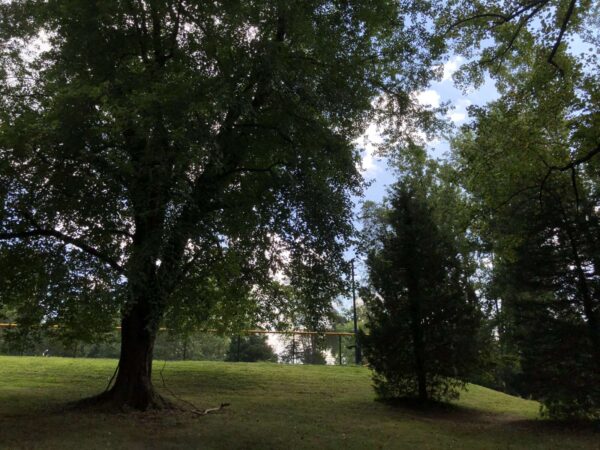
The Vienna Town Council is in agreement that it must finish rewriting the town’s zoning code by the end of 2023, but that’s where any unanimity on priorities for the coming year ends.
At its first regular meeting of the year on Monday (Jan. 9), the council voted 4-3 to set four top priorities for 2023: complete Code Create Vienna, develop a parks master plan, review the town’s noise ordinance, and explore ways to improve the local tree canopy.
While everyone agreed those initiatives are important, the town’s first zoning overhaul in 50 years is the only one that all members felt should be at the top of their to-do list.
“I agree with this in concept, but when I look at this list, I do question whether this is representing what the people in town would want as their top four priorities,” Councilmember Nisha Patel said of the proposal from her colleague, Ray Brill.
She called prioritizing Code Create “a no-brainer” but wasn’t sold on tree preservation as a top issue compared to traffic or vehicle break-ins, which get more resident complaints.
A report presented in October found that Vienna has lost approximately 163 acres of tree coverage since 2011.
The council discussed potential priorities for the next year at an almost four-hour-long conference session on Dec. 12, but the need to finish the zoning overhaul after more than two years of work was the only suggestion to get unanimous support, according to Mayor Linda Colbert.
The parks master plan will include a decision on long-term uses for the former Faith Baptist Church property that the town bought in September 2020. The site is temporarily housing the police department, which hasn’t moved into its new station months after the ribbon-cutting.
The town’s noise ordinance was opened up for review in July after years of resident complaints about violations from business and construction activities.
Colbert and Councilmember Ed Somers joined Patel in her wariness of designating top priorities without seeking public input on what exactly they should be.
“I know probably a lot of us support each other’s [suggestions] certainly, even if we didn’t rank them in the top four,” Colbert said. “I don’t think it would be responsible for us to vote on four priorities when we didn’t have that discussion in an open meeting.”
Attempts to postpone a vote until after a public hearing or to only approve Code Create as the council’s top priority failed, as other members countered that setting clear priorities would make the town government more efficient.
Councilmember Steve Potter said that a lack of focus has been a recurring issue for the council since he was first elected in 2019.
“We have public hearings, we have the ability of people to send in their concerns, and that can’t be ignored,” he said. “If we continue down this path, we are going to have the same problem that we’ve had before. We start something and it gets interrupted, we lose it, we go back to it later, and that is no way to run a business or an organization of any kind.”
Brill’s approved motion stressed that the designated quartet of priorities won’t preclude the council from addressing other issues or interfere with time-sensitive business, such as the annual budget cycle.
“We become more efficient rather than sort of kicking the can down the road on some issues that we’ve been dealing with for years,” Brill said. “When we focus, we can get them done, and we open up opportunities to get more done. This is a benefit to the town, to the residents, and we can do things in some ways like we’ve never done before.”
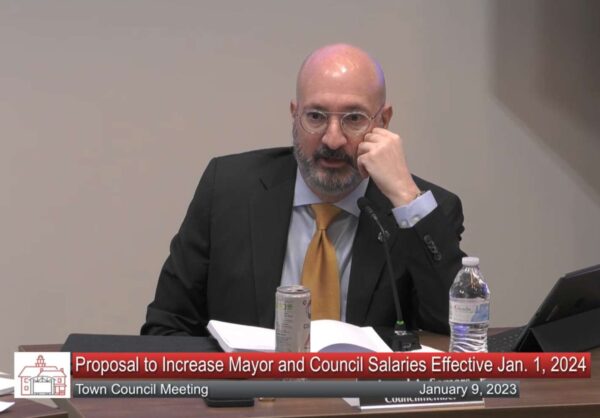
When 2024 comes around, Vienna’s mayor and town council will see a bump up in pay for the first time in years.
In a close 4-3 vote, the council approved 50% salary increases during its meeting on Monday (Jan. 9) that would raise the mayor’s annual pay to $11,250 and pay for town council members to $7,500.
In both cases, the increases are smaller than what town staff had recommended, keeping Vienna’s salaries for the positions below other similarly sized towns and cities in Northern Virginia.
“There’s so many things we want to do, and one of the things this council prides itself on is being fiscally responsible and setting priorities,” said Councilmember Ed Somers, who proposed those numbers. “…We are coming under what our staff was recommending as a total number. I think by doing it with an even percentage for council and for the mayor, that seems fair and understandable to the public.”
Vienna has paid its mayor $7,500 since 2014. The council’s annual salary has stayed flat at $5,000 since 2002.
Town staff suggested last month that the salaries be raised to $15,000 for the mayor and $12,000 for council members. That would bring them closer to the towns of Herndon and Leesburg, which both approved pay raises last year.

At the Dec. 12 conference session, however, some council members seemed hesitant support to significant raises amid an uncertain economic climate, suggesting that Vienna should narrow the gap between the mayor and council salaries.
Councilmembers Nisha Patel, Ray Brill and Howard Springsteen voted against the raises on Monday, though they didn’t provide explanations during the meeting. FFXnow didn’t get responses to requests for comment by press time.
After previously coming in May, Vienna’s elections for mayor and town council will be held on Nov. 7 after the Virginia General Assembly passed a law moving all municipal elections to November.
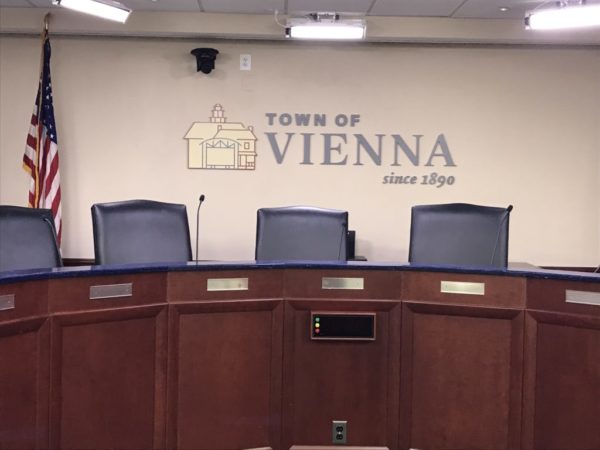
Vienna is considering more than doubling the salaries for mayor and town council going forward, but the current holders of those offices suggested they will aim lower amid still-high inflation, fears of a recession, and general economic uncertainty.
At a conference session on Monday (Dec. 12), town staff proposed bumping up the pay for town council members from $5,000 per year to $12,000, and from $7,500 per year to $15,000 for the mayor. It would be the first raise for the mayor since 2014 and the first for the council since 2002.
Acknowledging the awkwardness of elected officials discussing their own compensation, Mayor Linda Colbert noted that, based on a rough estimate of the hours she spends on the part-time job, her current salary is equivalent to $7.32 per hour — well under Virginia’s minimum wage of $11.
“Nobody wants to give themselves a raise. We’re public servants. That’s not the first thing on our mind,” Colbert said. “We’re always thinking about the residents, but I do think if we’re going to do this, staff has come up with a reasonable amount.”
If approved, the raises would be in place for Jan. 1, 2024, since Virginia law prohibits salary increases from taking effect during the incumbent mayor or town council’s term.
The suggested new salaries would still put Vienna below the towns of Herndon and Leesburg, which both approved pay hikes earlier this year. For city elected officials, compensation is limited by the state code based on the locality’s population, Vienna Finance Director Marion Serfass noted.
Still, some council members seemed wary of pushing for a significant raise, questioning the proposed $3,000 gap between the mayoral and council salaries compared to the approximately $1,000 difference seen in other jurisdictions.
“I think making a decision on this based on what other jurisdictions are doing in terms of the differential between council and mayor, I just like the optics of that a lot better,” Councilmember Nisha Patel said, suggesting that the mayoral salary should be closer to $13,000.
Councilmember Ed Somers said he’s fine with a bigger gap, considering that there are six council members and just one mayor.
“From a budgetary standpoint, the council collectively costs the taxpayers a lot more than the mayor does,” he said. “So, I am worried about the fiscal issues. I am worried about where we’re headed with the economy, so I still think the spread should be a little bit higher.”
While Colbert argued that Vienna “should be leaders” in terms of setting pay standards, Councilmembers Chuck Anderson and Howard Springsteen sided with Patel in preferring the “optics” of aligning with other localities.
The salary increases are expected to be put on the agenda item for the council’s Jan. 9 meeting before the upcoming budget cycle gets in full swing, according to Serfass.
“We’re going to be making difficult choices in a time when there’s a lot of economic uncertainty,” Anderson said. “We’re probably going to have to ask people to basically make sacrifices, and if we as a council aren’t willing to do that, then I think it’s really tough for us to look staff in the face and ask them to do that.”
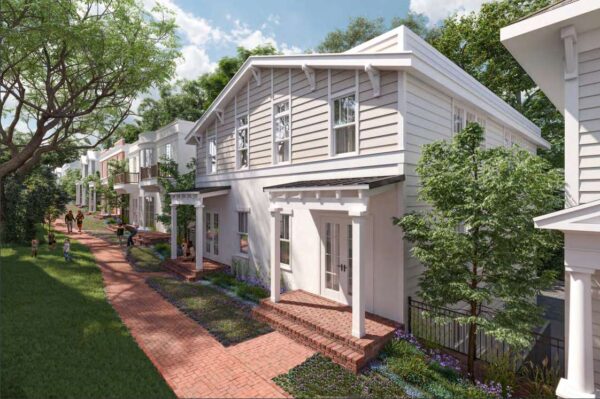
The Vienna Courts offices will officially be replaced with residential condominiums.
The Vienna Town Council voted Monday (Dec. 5) to approve a rezoning and site plans that would allow 12 two-story condo duplexes with two units each at 127-133 Park Street — a more modest project than the 30 units that developer BFR Construction originally proposed.
“This has been a long time coming, and in my opinion, this meets one of our biggest challenges going forward, which is to find lower-cost housing for Vienna,” said Councilmember Chuck Anderson. “We don’t have a whole lot of spaces for that, but this happens to be, I think, a very good space for it.”
Officials on the council — and the town’s planning commission before it — had pushed to scale back the project plans to create more open space on the 1.66-acre lot.
BFR President Steve Bukont had argued that the site’s long, narrow shape would make it difficult to meet that demand while also maintaining his vision of the development as an alternative to traditional single-family houses and townhomes for residents looking to age in place.
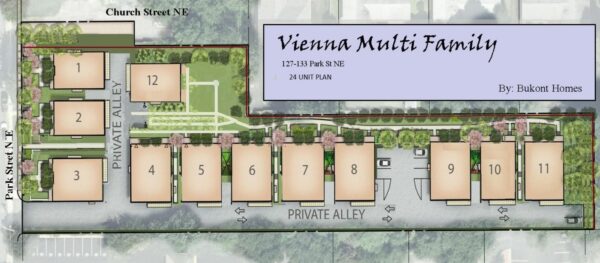
After initially requesting an allowance for 70%, the developer was able to get the lot coverage down to 61.5% by removing another building, slightly reducing the size of the remaining buildings and taking away three of the 19 proposed visitor parking spots.
The complex will now have a total of 64 parking spaces, including 48 garage spaces, 16 guest spaces and two Americans with Disabilities Act-compliant spaces.
The added space also came at the expense of a commitment to install solar panels and geothermal heating and air conditioning systems. The developer now says it reserves the right to install geothermal HVAC systems and will design the building roofs to support future solar panels, but the utilities aren’t guaranteed.
BFR will still install 5-foot-wide brick sidewalks and street lights and underground power lines along Park Street, according to a final proffer statement. The developer has also agreed to construct a privacy wall between its property and the adjacent house at 135 Park Street at the homeowner’s request.
The Vienna Courts redevelopment is the second duplex project that the council has approved in as many years, as Vienna seeks to provide a greater variety of housing.

